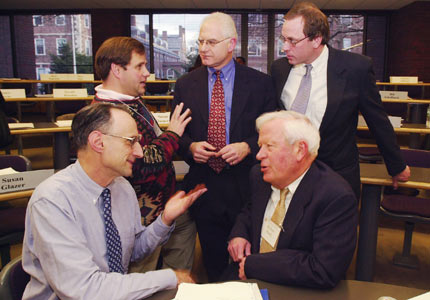KSG hosts city leaders in lively session
Cambridge officials from all domains get an unusual chance to gather and talk

Cambridge officials huddled with Kennedy School faculty Thursday (Jan. 10) to discuss the challenges facing local government in today’s trying economic and social times.
The second annual Senior Executive Program with the city of Cambridge, “Putting Vision into Practice – Managing During Times of Economic Uncertainty,” drew more than 60 Cambridge officials representing all parts of the city government, from police, fire and public safety, to community development, schools, transportation, and governance.
“I’m really pleased,” said Cambridge City Manager Robert Healy. “It’s a great opportunity for city people to interrelate with each other in a way they can’t do otherwise.”
The daylong program, sponsored by the Kennedy School and Harvard’s Office of Government, Community and Public Affairs, included sessions such as “Governing Greater Boston – How Cambridge Fits (or Doesn’t) in a Regional Context,” “Strategies for Ratcheting up Performance in Municipal Government,” “The Limits of Collaboration,” and “Lessons of Innovations.”
“We promised to give them an educational program where they could gather and meet out of the public eye each year,” said Manuel Stefanakis, director of Community and Fellowship Initiatives for the Kennedy School and one of the program’s organizers.
Nicolas Retsinas, director of the Kennedy School’s Joint Center for Housing Studies and the faculty chair of the Executive Program, said it provides a great opportunity for Kennedy School faculty to interact with – and learn from – the community around them.
“This is an opportunity to listen and learn,” Retsinas said. “We don’t only teach, we learn.”
Healy said that because such a broad representation of Cambridge government was present, the program gives Harvard’s faculty a rare chance to hear from all of city government, rather than a group of one type of official – such as city managers or police chiefs who may attend other events.
“This is a chance for the Kennedy School faculty to get a very diverse group of people in one room,” Healy said.
The program, held in the Littauer 140 lecture hall, attracted more people than last year, 66 compared with last year’s 55. Though the overall topic was economic uncertainty, Healy said the discussion touched on the events of Sept. 11 and the impact that that has had, economically and otherwise.
Cambridge Mayor Michael Sullivan said that aside from the interaction of KSG faculty and Cambridge officials, the program was important because it gives city officials a unique chance to hear what each other has to say.
“This is a chance for the staff to learn from each other,” Sullivan said. “Not very often do you see these people sitting in a room together.”
Charles Euchner, executive director of the KSG’s Rappaport Institute for Greater Boston, said the day’s events were fascinating for two reasons. First, because one could watch abstract ideas getting translated into reality by the people responsible for the hands-on running of city government, and second, because the program gave a chance for front-line city officials to talk with elected city officials.
“The people on the ground making things work don’t often have a chance to talk to the elected people who make the decisions,” Euchner said. “When you see it, it’s dynamic. It almost never happens. (But) I don’t know why it doesn’t happen everywhere.”
Contact Alvin Powell at alvin_powell@harvard.edu




